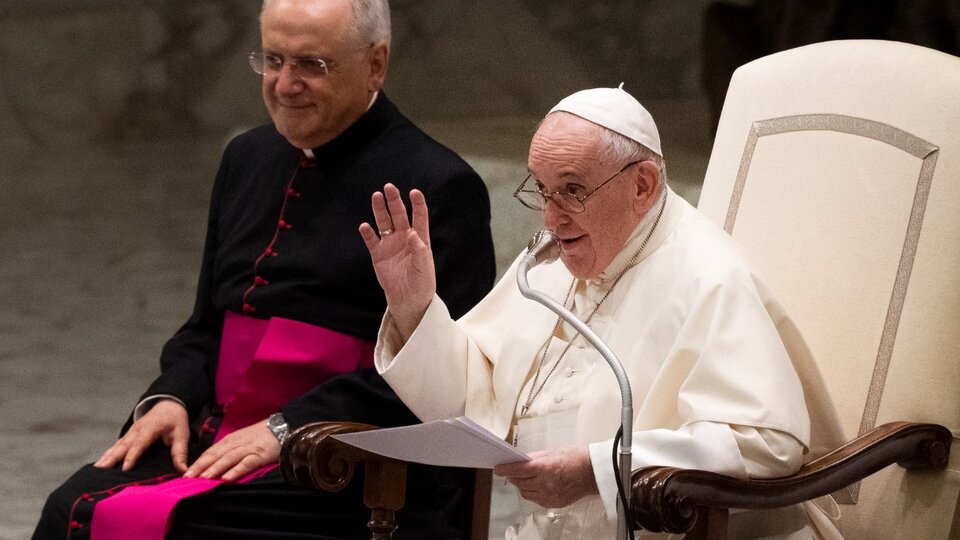
[ad_1]
The environmental crisis facing the universe and the proximity of the summit on the subject to be held in Glasgow next November brought together the highest authorities of the Catholic, Orthodox and Anglican churches, Pope Francis, Ecumenical Patriarch and Archbishop of Constantinople, Bartholomew I, and Archbishop of Canterbury, Justin Welby, in a joint document in favor of the “protection of creation”. In their statement, the religious leaders assure that “this is the first time that the three of us feel compelled to jointly address the emergency of environmental sustainability, its impact on persistent poverty and the importance of global cooperation. “. The highest authorities of these Christian churches maintain that “we have realized that, In the face of this global calamity, no one is safe until everyone is safe, that our actions really affect others, and that what we do today affects what happens tomorrow ”.
Ecumenical declaration
The document of only two pages, which bears the signature of the three religious leaders, has a dramatic tone when it makes the diagnosis of the environmental situation of humanity, it maintains that “today we pay the price” of the deterioration of nature, stresses that if the attitude “tomorrow could be worse” is not changed and warns that “Climate change is not just a future challenge, but an immediate and urgent matter of survival.”
Pope Francis is the highest authority in the Catholic Church, which has approximately 1,300 million faithful. The Orthodox Christians who recognize Bartholomew I as their spiritual leader are estimated at 220 million worldwide and the Christians who make up the Anglican World Communion led by Archbishop Welby number 85 million.
The joint declaration begins by recalling the health crisis facing the world. “For more than a year, we have all suffered the devastating effects of a global pandemic: all of us, rich or poor, weak or strong. Some were more protected or more vulnerable than others, but the rapid spread of the infection made us dependent on each other in our efforts to ensure our safety, ”stress Christian religious leaders and warn that in the face of these circumstances “We have to decide which world we want to leave for future generations”, that is to say “we must choose to live differently; we have to choose life ”.
And speaking directly to those attending the United Nations Climate Change Conference (COP26) in Glasgow “as leaders of our churches, we call on everyone, whatever their belief or worldview, to that they strive to hear the cry of the earth and the poor, examining their behavior and committing to make significant sacrifices for the good of the land God has given us.
Reflecting on the importance of sustainability, the signatories of the ecumenical document denounce that “we have maximized our own interests at the expense of future generations”. Because, they say, “as we focus on our wealth, we find that long-term assets, including nature’s wealth, are being depleted in favor of short-term benefits.”
The analysis then proceeds to the the impact that this reality has on people living in poverty, stressing that there is a “deep injustice” given that “the people who bear the most catastrophic consequences of these abuses (against nature and the environment) are the poorest on the planet and those who have had the least responsibility in provoking them ”.
Extreme weather conditions and disasters
According to Pope Francis, Patriarch Bartholomew and Archbishop Welby “we are paying the price” as mankind and “the extreme weather conditions and natural disasters of recent months reveal to us once again with great force and at a great human cost that climate change is not just a future challenge, but a matter of immediate and urgent survival”.
The text includes an austere description of the natural disasters facing the universe today. “Widespread floods, fires and droughts threaten entire continents. Sea level is rising, forcing many communities to relocate; cyclones devastate entire regions, destroying lives and livelihoods. Water has become scarce and the food supply is precarious, causing conflict and displacement for millions of people. We have seen it before in places where people depend on small farms. Today we see it in the most industrialized countries, where even sophisticated infrastructure cannot completely prevent extraordinary destruction, ”the document said.
Senior Christian leaders point out that as a society “we must recognize that the way we use money and organize our societies has not benefited everyone” and assume that “we find ourselves weak and anxious, overwhelmed. in a series of crises: health, environmental, food, economic and social, all deeply interconnected ”.
The diagnosis is followed by a request to act jointly in the certainty that “Together we can walk towards a more just and complete society with the most vulnerable at the center” but that means making changes and that “each of us, individually, must take responsibility for how we use our resources” affirming that “together, as communities, churches, cities and nations, we must change course and discover new ways of doing things. work together to break down traditional barriers between people, stop competing for resources and start collaborating ”.
And those with responsibilities in governance, business management, employment of people, and investment of funds are encouraged to choose “people-centered benefits” and become “Among the leaders of the transition to just and sustainable economies”.
The senior Christian religious leaders document concludes by noting that “God’s care of creation is a spiritual mandate that requires a committed response. This is a critical moment. The future of our children and that of our common home depend on it ”.
[email protected] .
[ad_2]
Source link
 Naaju Breaking News, Live Updates, Latest Headlines, Viral News, Top Stories, Trending Topics, Videos
Naaju Breaking News, Live Updates, Latest Headlines, Viral News, Top Stories, Trending Topics, Videos